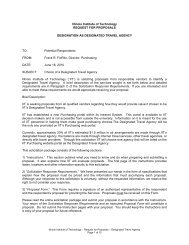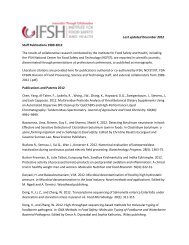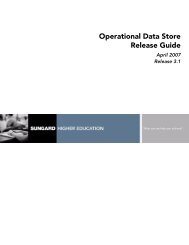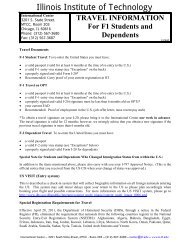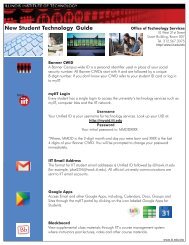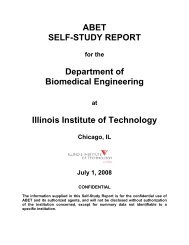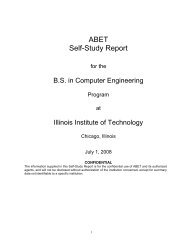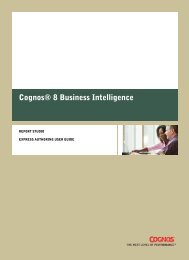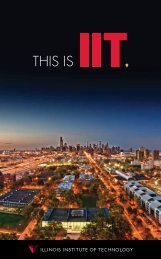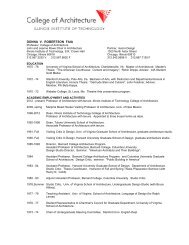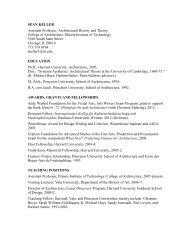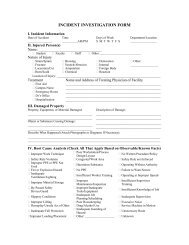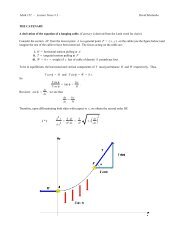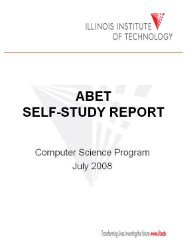Download entire Student Handbook - Illinois Institute of Technology
Download entire Student Handbook - Illinois Institute of Technology
Download entire Student Handbook - Illinois Institute of Technology
You also want an ePaper? Increase the reach of your titles
YUMPU automatically turns print PDFs into web optimized ePapers that Google loves.
State Street Village, McCormick <strong>Student</strong> Village, Carmen Hall and Gunsaulus Hall;<br />
All restaurants and bar areas;<br />
Public places;<br />
Public restrooms, lobbies, reception areas, hallways and other common use areas in public buildings,<br />
apartment buildings and condominium buildings;<br />
Within 15 feet <strong>of</strong> the entrance to enclosed public places; and<br />
Recreational areas including enclosed sports arenas, stadiums, swimming pools, ice and roller rinks,<br />
arcades and bowling alleys.<br />
In order to comply with the ordinance, IIT prohibits smoking in all <strong>of</strong> the above listed locations on all IIT<br />
campuses, and requires students, faculty, employees and guests to adhere to the ordinance and smoke at<br />
least 15 feet away from the entrance to any building.<br />
Smoking in the private areas <strong>of</strong> IIT apartments, not including the residence halls, is permitted,<br />
unless an area has been designated as non-smoking.<br />
Violations <strong>of</strong> the smoking policy should be reported to the building representative who shall forward them<br />
to the appropriate administrative <strong>of</strong>ficer.<br />
M. <strong>Student</strong> Intellectual Property<br />
1. Work Done for Course Credit<br />
Work done for course credit by students, including IPROs, is not considered university-owned for purposes<br />
<strong>of</strong> IIT’s copyright and patents policies. Such work belongs exclusively to the students. A faculty or staff<br />
members wishing to use student-created work done for credit for his or her own purposes or for IIT<br />
purposes must obtain the student’s consent and, at a minimum, provide adequate credit to the student.<br />
In general, if work done for course credit by students is a collaborative effort among a group <strong>of</strong> students<br />
(e.g. IPROs), meaning each such student actively participated and contributed to the creation <strong>of</strong> the work,<br />
then, each student will likely be deemed a creator/inventor <strong>of</strong> the work, and each student will have the right<br />
to use and allow others to use the work without the need to secure the consent <strong>of</strong> and without obligation to<br />
the others. Prior to commencement <strong>of</strong> a collaborative effort, participating students should consider the<br />
merits <strong>of</strong> entering into a written agreement among themselves setting forth various matters related to the<br />
ownership and use <strong>of</strong> such works, including, without limitation, how and when such work may be used. In<br />
any event, even absent an agreement, students should always give appropriate attribution to all team<br />
members involved whenever the work is used or authorized for use. The foregoing is intended as merely<br />
a general statement. <strong>Student</strong>s must understand that the actual rights <strong>of</strong> each student participating in a<br />
particular collaborative effort will ultimately be determined by applicable patent, copyright or other<br />
intellectual property rights statutes.<br />
2. Work Done with Third-Party Sponsorship<br />
Ownership <strong>of</strong> and the right to use work created as part <strong>of</strong> a research project that is sponsored by a third<br />
party, whether a government agency, foundation or corporation, generally qualifies as university research,<br />
and the ownership <strong>of</strong> and use rights associated therewith will be determined in accordance with the<br />
applicable terms and provisions <strong>of</strong> the sponsorship agreement. In such instances, the ownership <strong>of</strong> and<br />
the rights to use the work will generally vest with IIT and/or the sponsoring entity, not the student. Any<br />
invention, creation or copyrightable work, including s<strong>of</strong>tware, stemming from a sponsored research project<br />
must be disclosed to IIT in accordance with the procedures set forth in Appendix K <strong>of</strong> the IIT Faculty<br />
<strong>Handbook</strong>.<br />
In general, because IPROs are done for course credit, IPROs are not considered sponsored research<br />
projects. This means that the ownership <strong>of</strong> and the rights to use works created in connection with an<br />
IPRO are governed by the preceding Section, Work Done for Course Credit. So an entity supporting a<br />
particular IPRO would need to negotiate with the student or students that created a work to secure<br />
ownership <strong>of</strong> or the right to use a work coming out <strong>of</strong> an IPRO.<br />
3. Work Done Outside <strong>of</strong> Course Credit<br />
To the extent that any work created by a student or students other than for course credit qualifies as



